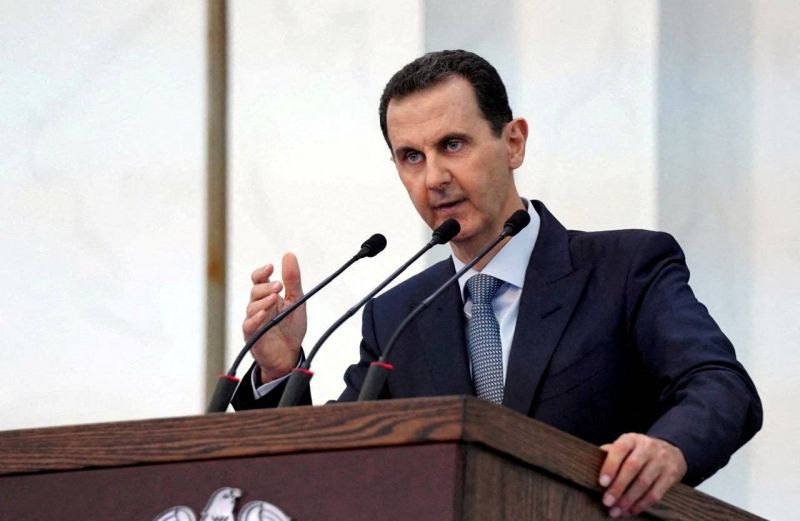
Syrian President Bashar al-Assad outside the parliament building in Damascus. (Credit: Reuters)
“I think the main reason why Saudi Arabia is opening up to the Syrian regime is the Captagon,” says Karam Shaar, a researcher at the Middle East Institute. "It is time for pragmatism,” for the Saudi Kingdom, he adds.
From Riyadh’s involvement in the Yemeni conflict to the murder of journalist Jamal Khashoggi, the rise to power of Crown Prince Mohammed bin Salman has been stained with scandal and unpredictability. The de facto Saudi ruler now seeks to reverse the trend.
“After the unprecedented reconciliation with Iran, Riyadh’s main concern is to ensure its security, particularly in the face of the Yemeni Houthis, in order to focus on its economic and tourism development,” says Joseph Daher, a lecturer and researcher at Lausanne University who has written about the region’s political economy.
The Syrian waiting game
It is in this new context that Saudi Arabia is reportedly about to invite Syrian President Bashar al-Assad to the Arab League summit in May.
This initiative, taken in the wake of Abu Dhabi’s rapprochement with Damascus, followed by other Arab capitals after the deadly earthquake that struck Syria on Feb. 6, could complete the end of Syria’s decade-long regional isolation.
One of the main conditions set by Riyadh for this normalization after 12 years of enmity is to end Captagon trafficking, according to several Gulf media outlets.
Indeed, Syria produces 80 percent of the world’s Fenethylline-based synthetic drug, according to analysts, and Saudi Arabia is the main outlet of this lucrative trade. Profits were said to be $10 billion dollars in 2022, causing numerous public health problems.
According to Daher, being the “main producer and exporter of Captagon,” the Syrian regime could “easily decide to divert the flow of Captagon to the Gulf market.”
But Assad is more likely to give Riyadh limited assurances without disrupting the illicit drug trade, a strategy that the Heinrich Böll Foundation’s Middle East director Bente Scheller has called the “wisdom of the Syrian game of attrition.”
Thus, “since the beginning of the year, Syrian forces conducted several raids against drug traffickers, mainly on the border with Jordan, to deliver a message to Riyadh,” says Hamza Hasil, a researcher at the Ankara-based ORSAM Center for Middle Eastern Studies. The Syrian authorities intend “to give the impression that they have stepped up the fight against drug trafficking.”
However, Scheller warns that the Syrian regime’s promises are only binding on those who believe them: “Knowing that the Saudi kingdom is concerned about Captagon, Assad is going to play this card to the full. However, we should not expect him to live up to his commitments.”
Ayman al-Dassouky, a researcher at Omran for Strategic Studies, agrees: “I think the regime will hand over some of the foot soldiers in the drug trade as a goodwill gesture, but the bigwigs will be spared.”
Cooperating on form, not on substance
Over the 12 years of the Syrian conflict, Assad has repeatedly adopted the same approach: “Cooperating on the form, but not on substance,” summarizes Scheller.
She adds that after the regime’s deadly chemical weapons attack in the East Ghouta suburbs of Damascus in August 2013, considered a red line by Washington, Assad had promised to destroy its chemical weapons.
This promise did not prevent the regime from repeating chemical attacks on civilians several times.
In terms of Captagon, Jordan, which reconciled with Syria in 2021, paid the price for this rhetoric.: “The normalization of bilateral relations also implied an end to the smuggling of Captagon,” Scheller says. “Since then, however, Jordanian authorities have reported a 50 percent increase in [drug] seizures.”
The question, however, is whether Riyadh is so naive as to believe that Damascus will really put an end to drug trafficking, “one of the most strategic and rapid sources of income for the regime,” according to Hasil.
Shaar adds that Saudi Arabia does not expect to obtain any real concessions from Assad, “but is nonetheless convinced that it is in its interest to carry out a policy of small steps with him.”
Thus, although they set as a precondition for normalization the end of trafficking in Captagon, “the Saudis are ready to make this diplomatic rapprochement either way,” says Hasil.
A trump card not to be wasted
Damascus intends to take advantage of the hand extended by Riyadh without scrapping its trade in the lucrative pills.
As an alternative to Riyadh, Damascus could look for other outlets in the Gulf countries. However, Daher says, “it will be difficult to find a market as lucrative as Saudi Arabia,” where the pill can sell for up to $25 a pop, compared to approximately $1 in the rest of the region.
The authorities could also claim that Captagon production is taking place in rebel-held areas that are beyond its control, Hasil says. “Thus, the regime could show goodwill in the fight against this traffic to the Saudi authorities” without having to show convincing results.
In any case, he says, Damascus knows that “normalization with Riyadh could open up the doors to the Arab world, so it intends not to waste this trump card.”
This article was originally published in French in L’Orient-Le Jour. Translation by Joelle El Khoury.